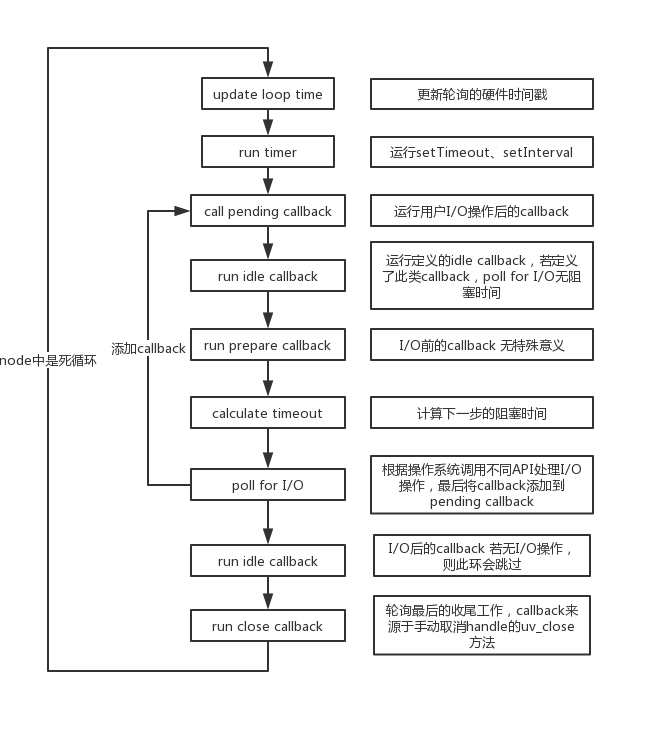上一篇講了輪詢的邊角料,這篇進入正題。 Poll for I/O The loop blocks for I/O. At this point the loop will block for I/O for the duration calculated in the previous step. ...
上一篇講了輪詢的邊角料,這篇進入正題。(竟然真有人看我博客,上兩個圖給你們整理下思路)
這是輪詢總流程圖。

下圖為本節內容簡圖。

Poll for I/O
The loop blocks for I/O. At this point the loop will block for I/O for the duration calculated in the previous step. All I/O related handles that were monitoring a given file descriptor for a read or write operation get their callbacks called at this point.
簡單來講,就兩點:
1、根據計算的timeout來進行I/O操作,這裡的操作包括fs.readFile、fs.stat等,期間進程將被阻塞。
2、所有I/O的handles會使用一個給定的文件描述符進行操作,並會調用對應的callbacks。
Call pengding callbacks
Pending callbacks are called. All I/O callbacks are called right after polling for I/O, for the most part. There are cases, however, in which calling such a callback is deferred for the next loop iteration. If the previous iteration deferred any I/O callback it will be run at this point.
從解釋中看不出什麼信息,但只有這一步真正調用我們從JS傳過去的callback。
既然要解析,那麼不如從一個API入手,走一遍看代碼流向。
這裡還是用之前fs.stat方法,雖然在前面(https://www.cnblogs.com/QH-Jimmy/p/9395985.html)有過看似很深入的解釋,但也只是走馬觀花的看了一遍,這次重新梳理一遍。
與上篇一樣,省略大量無關源碼。
JavaScript層
同樣從簡易的lib/fs.js文件中出發,這次著重註意的是傳過去的三個參數。
function stat(path, options, callback) { // ... // FSReqCallback是來源於c++層的一個class const req = new FSReqCallback(options.bigint); req.oncomplete = callback; // 這裡的第三個參數是一個Object 回調函數僅作為一個oncomplete屬性 binding.stat(pathModule.toNamespacedPath(path), options.bigint, req); }
如下:
1、第一個是處理過的路徑path
2、第二個是一個可選參數,一般情況沒人傳,本文也不會做解析,畢竟不是重點
3、第三個是一個新生成的對象,而不是將我們的function直接作為參數傳到stat方法中
node層
接下來直接到src/node_file.cc文件中,這裡會檢測參數並做包裝,不用懂C++直接看註釋。
static void Stat(const FunctionCallbackInfo<Value>& args) { Environment* env = Environment::GetCurrent(args); // 檢測參數數量是否大於2 const int argc = args.Length(); CHECK_GE(argc, 2); // 檢測path參數合法性 BufferValue path(env->isolate(), args[0]); CHECK_NOT_NULL(*path); // 檢測是否傳了use_bigint bool use_bigint = args[1]->IsTrue(); // 在同步調用stat的情況下 這個class為空指針 // if、else後面有同步/非同步調用時參數情況 FSReqBase* req_wrap_async = GetReqWrap(env, args[2], use_bigint); if (req_wrap_async != nullptr) { // stat(path, use_bigint, req) AsyncCall(env, req_wrap_async, args, "stat", UTF8, AfterStat, uv_fs_stat, *path); } else { // stat(path, use_bigint, undefined, ctx) // 同步情況... } }
在之前那一篇講node架構時,這塊只是簡單說了一下,直接跳到同步調用那塊了。
但是只有在非同步調用的時候才會出現poll for I/O,所以這次跳過同步情況,來看非同步調用情況。(那一篇的非同步情況是瞎雞兒亂說的,根本沒法看)
首先整理一下AsyncCall方法的參數。
AsyncCall(env, req_wrap_async, args, "stat", UTF8, AfterStat,uv_fs_stat, *path);
env => 一個萬能的全局對象,能存東西能做事情。可以通過env->isolate獲當前取V8引擎實例,env->SetMethod設置JS的對象屬性等等
req_wrap_async => 一個包裝類
args => 從JavaScript層傳過來的函數數組,可以簡單理解為arguments
"stat" => 需要調用的fs方法名字元串
UTF8 => 編碼類型
AfterStat => 一個內置的一個回調函數
uv_fs_stat => 非同步調用的實際方法
*path => 路徑參數
參數看完,可以進到方法里,這是一個模版函數,不過也沒啥。
// Func類型為普通函數 // Args為路徑path template <typename Func, typename... Args> inline FSReqBase* AsyncCall(Environment* env, FSReqBase* req_wrap, const FunctionCallbackInfo<Value>& args, const char* syscall, enum encoding enc, uv_fs_cb after, Func fn, Args... fn_args) { return AsyncDestCall(env, req_wrap, args, syscall, nullptr, 0, enc, after, fn, fn_args...); } template <typename Func, typename... Args> inline FSReqBase* AsyncDestCall(Environment* env, FSReqBase* req_wrap, const FunctionCallbackInfo<Value>& args, const char* syscall, const char* dest, size_t len, enum encoding enc, uv_fs_cb after, Func fn, Args... fn_args) { // 非同步調用這個類不能為空指針 CHECK_NOT_NULL(req_wrap); // 依次調用包裝類的方法 req_wrap->Init(syscall, dest, len, enc); int err = req_wrap->Dispatch(fn, fn_args..., after); if (err < 0) { // 出現error的情況 不用看... } else { req_wrap->SetReturnValue(args); } return req_wrap; }
看似一大團,實際上函數內容非常少,僅僅只有一個Init、一個Dispatch便完成了整個stat操作。
由於都來源於req_wrap類,所以需要回頭去看一下這個類的內容。
FSReqBase* req_wrap_async = GetReqWrap(env, args[2], use_bigint); inline FSReqBase* GetReqWrap(Environment* env, Local<Value> value, bool use_bigint = false) { if (value->IsObject()) { return Unwrap<FSReqBase>(value.As<Object>()); } else if (value->StrictEquals(env->fs_use_promises_symbol())) { // Promise情況... } return nullptr; }
不用看Promise的情況,在最開始的講過,傳過來的第三個參數是一個新生成的對象,所以這裡的args[2]正好滿足value->IsObject()。
這裡的return比較魔性,沒有C++基礎的不太好講,先看看源碼。
template <class T> static inline T* Unwrap(v8::Local<v8::Object> handle) { // ... // 這裡是類型強轉 return static_cast<T*>(wrap); } class FSReqBase : public ReqWrap<uv_fs_t> { public: // ... void Init(const char* syscall, const char* data, size_t len, enum encoding encoding) {} } template <typename T> class ReqWrap : public AsyncWrap, public ReqWrapBase { public: // ... inline int Dispatch(LibuvFunction fn, Args... args); private: // ... };
剔除了所有無關的代碼,留下了一些關鍵信息。
簡單來講,這裡的Unwrap是一個模版方法,作用僅僅是做一個強轉,關鍵在於強轉的FsReqBase類。這個類的繼承鏈比較長,可以看出類本身有一個Init,而在父類ReqWrap上有Dispatch方法,知道方法怎麼來的,這就足夠了。
這裡重新看那兩步調用。
req_wrap->Init(syscall, dest, len, enc); int err = req_wrap->Dispatch(fn, fn_args..., after);
首先是Init。
void Init(const char* syscall, const char* data, size_t len, enum encoding encoding) { syscall_ = syscall; encoding_ = encoding; if (data != nullptr) { // ... } }
四個參數實際上分別是字元串"stat"、nullptr、0、枚舉值UFT8,所以這裡的if不會走,只是兩個賦值操作。
接下來就是Dispatch。
template <typename T> template <typename LibuvFunction, typename... Args> int ReqWrap<T>::Dispatch(LibuvFunction fn, Args... args) { Dispatched(); // This expands as: // // int err = fn(env()->event_loop(), req(), arg1, arg2, Wrapper, arg3, ...) // ^ ^ ^ // | | | // \-- Omitted if `fn` has no | | // first `uv_loop_t*` argument | | // | | // A function callback whose first argument | | // matches the libuv request type is replaced ---/ | // by the `Wrapper` method defined above | // | // Other (non-function) arguments are passed -----/ // through verbatim int err = CallLibuvFunction<T, LibuvFunction>::Call(fn, env()->event_loop(), req(), MakeLibuvRequestCallback<T, Args>::For(this, args)...); if (err >= 0) env()->IncreaseWaitingRequestCounter(); return err; }
這個方法的內容展開之後巨麻煩,懶得講了,直接看官方給的註釋。
簡單來說,就是相當於直接調用給的uv_fs_stat,參數依次為事件輪詢的全局對象loop、fs專用handle、路徑path、包裝的callback函數。
這篇先這樣。



